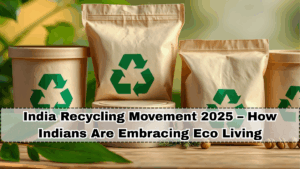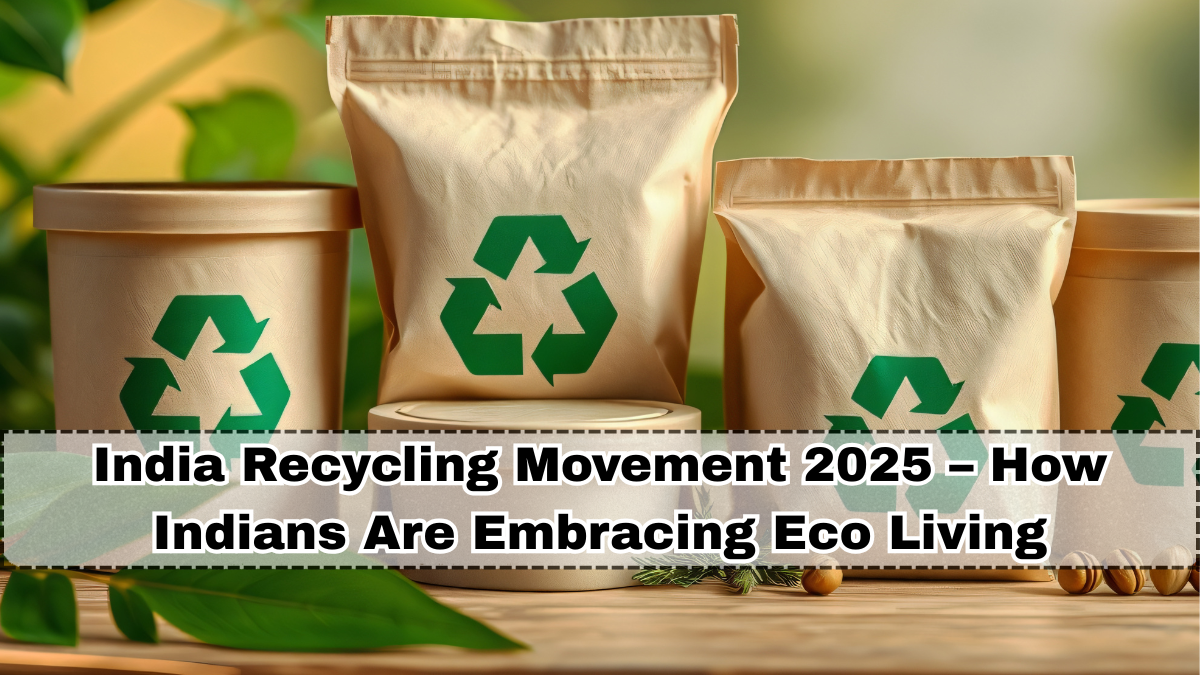Environmental awareness is rising across the country, and India Recycling Movement 2025 marks a major shift toward sustainable living. With growing concerns about climate change, plastic waste, and pollution, Indians are adopting smarter recycling habits at home, in offices, and through community-driven initiatives. This year has seen a massive push toward waste segregation, reusing materials, and embracing eco-friendly products.
From metropolitan cities to small towns, the recycling movement is turning into a lifestyle choice, shaping how India manages waste and protects the environment.

Home Waste Segregation Becomes a Daily Routine
The foundation of India Recycling Movement 2025 lies in the growing adoption of waste segregation at home. More families are dividing waste into:
• Wet waste
• Dry waste
• Recyclables
• Hazardous waste
Cities like Bengaluru, Indore, and Pune are leading the way by enforcing strict segregation rules and rewarding compliant households. This basic shift makes large-scale recycling far easier and more effective.
Rise of Recycling Startups & Green Businesses
India’s green economy is booming with new startups focused on sustainability. These companies are introducing services like:
• Doorstep recycling pickup
• Plastic-to-fuel conversion
• E-waste collection
• Compost kit delivery
• Recycled product marketplaces
These innovations highlight how technology and entrepreneurship are fuelling the India Recycling Movement 2025.
Plastic Alternatives Gain Popularity
One of the biggest changes in 2025 is the move toward eco-friendly alternatives. Indians are increasingly choosing:
• Bamboo cutlery
• Cloth bags
• Compostable packaging
• Reusable water bottles
• Stainless steel straws
Government regulations and social media awareness have accelerated the shift away from single-use plastics.
Schools & Colleges Promote Eco Education
India’s youth is actively shaping the recycling wave. Schools now include:
• Zero-waste campus programs
• Eco clubs
• Recycling drives
• Plastic collection challenges
• Composting lessons
These initiatives ensure the next generation grows up with strong sustainability values. Students’ participation plays a major role in strengthening India Recycling Movement 2025.
Upcycling Becomes a Trendy Lifestyle Choice
Upcycling—turning old products into creative new items—is gaining huge traction. Popular upcycling ideas in 2025 include:
• Old sarees turned into bags
• Glass jars used as planters
• Furniture made from recycled wood
• Handmade decor from scrap materials
Social media creators showcase DIY ideas, inspiring thousands of people to reduce waste creatively.
Community Collection Drives Strengthen Impact
Local communities are organising weekend recycling drives to collect:
• E-waste
• Plastic bottles
• Old clothes
• Books
• Metal scraps
These drives build awareness and unite neighbourhoods in climate-friendly action. This collective effort makes India Recycling Movement 2025 more effective and widespread.
Corporate India Joins the Green Mission
Companies are implementing:
• In-office waste segregation
• Recyclable packaging for products
• Zero-waste events
• Employee eco challenges
• Paperless workflows
Many brands have pledged to reduce their carbon footprint, making sustainability a core part of corporate culture.
FAQs
What makes recycling more popular in India in 2025?
Increased awareness, government policies, and eco-friendly startups have made recycling easier and more accessible.
What can households recycle easily?
Paper, plastic bottles, metal cans, cardboard, glass, and certain textiles are commonly recycled.
Are Indian cities improving waste management?
Yes, cities like Indore, Pune, and Bengaluru have significantly upgraded waste segregation and collection systems.
How can individuals reduce waste at home?
By using reusable products, composting kitchen waste, and segregating trash properly.
Is upcycling useful?
Yes, it reduces waste and turns old items into new, functional, or decorative products.
Click here to know more,
